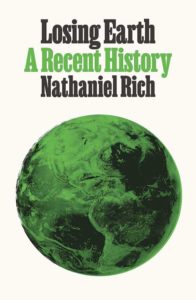Losing Earth: A Recent History
Reviewed by Phil Favero
November 1, 2019
 By Nathaniel Rich. Farrar, Straus and Giroux, 2019. 224 pages. $25/hardcover; $11.99/eBook.
By Nathaniel Rich. Farrar, Straus and Giroux, 2019. 224 pages. $25/hardcover; $11.99/eBook.
Nathaniel Rich’s book Losing Earth: A Recent History is a convincing story of the history of climate change policy, but it does not serve as a guide for engaging the problem.
By using biographical sketches of key environmental leaders—lobbyists, scientists, corporate managers, politicians, and political advisors—Rich paints a tragic picture of how the United States failed to address climate change in the 1980s, even though our leaders, at that time, knew the gravity of the problem and what needed to be done. Rich attributes the failure to a moral flaw in human nature: the unwillingness to make relatively small sacrifices in the present for the well-being of people in the future. U.S. leaders in the 1980s, with few exceptions, protected their short-term interests—re-election prospects, annual profits, and reputations for being temperate advisors—by willfully ignoring the impacts of climate change on their (our) children and their (our) progeny. As a result, we find ourselves today in a most urgent situation: a rapidly heating globe with amplifying feedback effects, such as loss of albedo and melting permafrost—making management of the problem difficult, if not impossible.
What should we now do? Readers looking for a detailed plan of action won’t find one here, but Rich offers a persuasive framework for discussion that will lead to action. He first suggests that we “speak about the problem honestly: as a struggle for survival.” He observes there’s been a shift in how people relate to the no longer distant perils of climate change, gravely claiming that “disasters alone will not revolutionize public opinion in the remaining time allotted to us. It is not enough to appeal to narrow self-interest.” In the book’s concluding paragraphs, Rich warns of a scenario to be avoided at all costs: that “should we pursue the status quo for the next dozen years . . . the fears of young people will continue to grow, in pace with the multiplying tragedies of a warming world.” Eventually, “the fears of the young will overwhelm the fears of the old,” and “the young will amass enough power to act.” Like the author, I cannot idly wait for that time, and I hope you cannot wait either.
The situation calls for a mass movement, and Friends can aid that movement. In his book Healing the Heart of Democracy, Parker Palmer provides an outline that we can apply to facilitate such a movement: First, have compassion for and follow the lead of those who suffer. We can apply this to the initial victims of climate change around the world. Second, form “communities of congruence.” In Quakerspeak that means forming groups in monthly meetings to build the “disposition, knowledge, and skills” to enter the fray of politics. Third, go public. We should put our convictions into the marketplace of ideas, and hone them in public debate. Form coalitions of advocacy with like-minded groups. Become involved in the 2020 election from the local to the national level, and throw the climate deniers and obstructionists out of office. Fourth, look for signs of success and amplify them. When applied to climate change, there are many social and technical opportunities to do this.
Young people are now expressing their fears and urging public action to mitigate climate change. Greta Thunberg is the new Rosa Parks in starting Friday strikes from school. Young plaintiffs are suing the government in Juliana v. United States. The youth-led Sunrise Movement is advocating for the Green New Deal. Young Friends and young adult Friends can get involved; older Friends can support these changes, make them better known, and, through our experience and insights, add value to them.
Climate change has an equally evil twin: the sixth mass extinction. Here too, Quakers are uniquely poised to participate in a movement. Can we extend our common belief that there is that of the Divine in everyone to there is that of the Divine in every living thing? If so, Friends could help humans shift our conventional attitudes about nature from that of use to that of care.



Comments on Friendsjournal.org may be used in the Forum of the print magazine and may be edited for length and clarity.